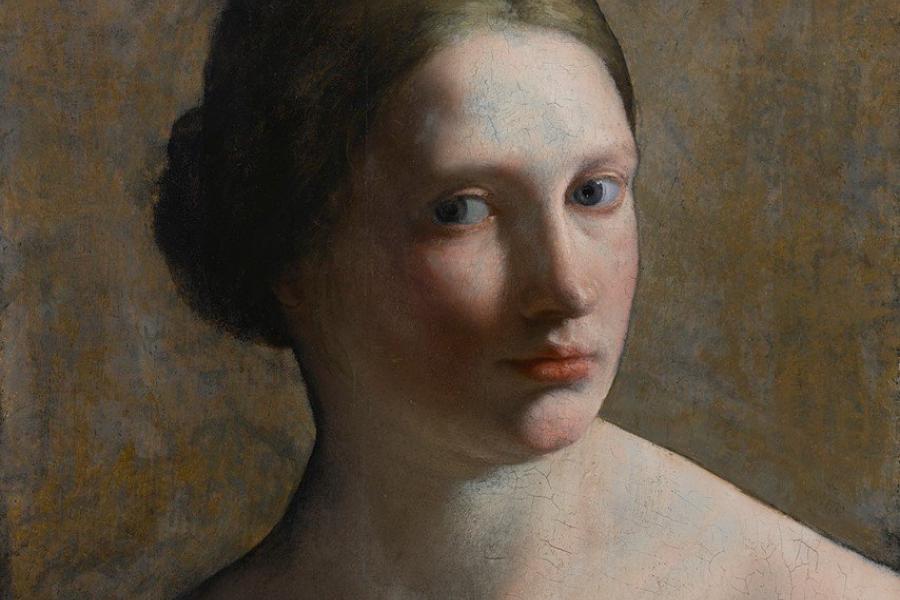Orazio Gentileschi’s intriguing Head of a Woman once formed part of one of the world’s greatest art collections – that of King Charles I of England. Painted during the first half of the 1630s, this hauntingly beautiful painting may have been one of the King’s favourite works, as it hung in his private quarters at Whitehall palace.One of only two surviving works by the artist on panel, Head of a Woman appears to have been subjected to an extreme form of censorship at some stage in its long history; an inventory of the King’s collection, drawn up between 1637 and 1639, describes “the Picture of a woeman with her left breast naked her right breast covered with a part of her Smock”. The panel must have therefore been reduced, predominantly along the lower edge, perhaps by a previous owner with a keen sense of decorum.
Head of a Woman boasts a fascinating history – it was one of the 1,300 paintings from Charles’s celebrated collection that were infamously offered for sale by Oliver Cromwell’s government, following the King’s execution for treason in 1649. The works were moved from the Royal Palaces to Somerset House, where they were sorted and designated for sale. It was there that Head of a Woman was acquired by Robert Houghton of Southwark in London, “gentleman and brewer to the late King”, in lieu of debts owed to him by Charles. A staunch puritan and financial sponsor of the Massachusetts Bay Colony, Houghton was one of the earliest visitors to the sale of the King’s goods at Somerset House; at the time, he also purchased a set of tapestries, Raphael’s Acts of the Apostles, which had been a gift to King Henry VIII from Pope Leo X. Houghton later brokered their sale to the Spanish Ambassador for the princely sum of £4,429.
Though several works in the collection were reunited following Charles II’s restoration, Head of a Woman did not resurface again for 300 years, until it emerged in an exhibition at the Royal Academy in 1930. The painting was last seen in public in the landmark exhibition on Orazio and Artemisia Gentileschi at the Metropolitan Museum of Art in 2001. It now comes to auction for the first time in its 380 year history, after Sotheby’s sale of Gentileschi’s magnificent Danaë to the J. Paul Getty Museum in Los Angeles for a record $30.5 million.
Orazio Gentileschi in the English CourtBorn in Pisa in 1563, Orazio Gentileschi took on the role of court painter for Charles I in 1626. Though his work was admired by loyal patrons and leading collectors of the time, Gentileschi’s presence and success at court were cause for resentment; in 1627, a group of English painters presented a petition to the king, in which they complained that too many foreign artists – among them Gentileschi – were stealing their work. The petition was unsuccessful, and Gentileschi remained in the court until his death in 1639.
Among Gentileschi’s most fervent supporters was Queen Henrietta Maria, who commissioned two masterworks for the Queen’s House in Greenwich: the Allegory of Peace and the Arts, now at Marlborough House in London, and Joseph and Potiphar’s Wife, which today hangs at Hampton Court. Upon his death, Gentileschi was given the singular honour of burial in the recently completed Catholic Chapel designed for Queen Henrietta Maria at Somerset House – the very same location where Charles I’s art collection would be dispersed a decade later.
Head of a Woman (est. $2-3 million) will be offered at Sotheby’s New York on January 25th, 2016.
 Orazio Gentileschi HEAD OF A WOMAN Estimate 2,000,000 — 3,000,000 - Mit freundlicher Genehmigung von: sothebys.com
Orazio Gentileschi HEAD OF A WOMAN Estimate 2,000,000 — 3,000,000 - Mit freundlicher Genehmigung von: sothebys.com